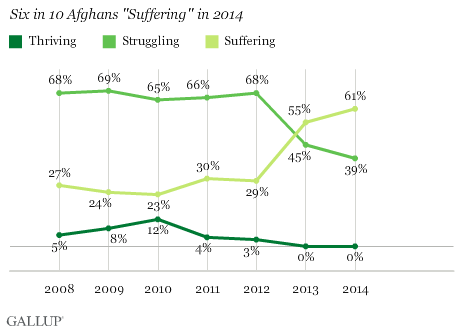By Steve Crabtree
WASHINGTON, D.C. -- As delegates from around the world depart the United Kingdom following Thursday's London Conference on Afghanistan, a new Gallup World Poll underscores just how bleak life is for most Afghans. Already the worst in the world in 2013, Afghans' ratings of their lives declined even further in 2014. More than six in 10 Afghans evaluate their lives poorly enough to be considered "suffering" -- the highest figure ever recorded for any country since Gallup started tracking life evaluations in 2005. As in 2013, no Afghans rate their lives highly enough to be considered "thriving."

Gallup classifies people as "thriving," "struggling" or "suffering" according to how they rate their current and future lives on a ladder scale with steps numbered from zero to 10 based on the Cantril Self-Anchoring Striving Scale. Gallup considers people to be suffering if they rate their current lives a 4 or lower and predict that their lives in five years will be at a 4 or lower. Respondents do not label themselves as suffering, struggling or thriving.
Afghans living in rural areas (representing about three-fourths of the total population) are more likely to be suffering than those in urban areas -- 64% vs. 49%, respectively. Though poverty is common throughout the population, it is most prevalent among rural Afghans: 44% say there were times in the past year when they didn't have enough money to buy food for themselves or their families, versus 32% among urban residents. Rural Afghans are also far less likely than their urban counterparts to be satisfied with vital infrastructure such as schools, healthcare services and roads.
Regionally, life evaluations tend to get better moving from western to eastern Afghanistan. A number of possible factors may influence this pattern: Afghans in some western and southern areas are particularly vulnerable to drug addiction, as opium cultivation is most prevalent in these regions. Fears about deteriorating security conditions in the absence of Western troops may also be especially damaging to Afghans' optimism in southern provinces such as Helmand, which were Taliban strongholds prior to the U.S. troop surge in 2010.

With the Taliban and other insurgent groups still actively recruiting new members in Afghanistan, lack of hope among young men is a particular concern. In many countries, younger people give more positive life evaluations, particularly when rating their future lives. In Afghanistan, however, there are few differences in suffering by gender or age. Among men between the ages of 15 and 24, 58% are suffering, not far from the figure for the overall population (61%).
Optimism About Local Economic Conditions Hits Record Low
Given that the 13-year NATO-led combat mission in Afghanistan ends this month, security concerns were top of mind for many delegates at Thursday's conference in London. However, the country's dire economic situation, which has been further strained by recent terror attacks as well as the departure of foreign troops, is also a major concern. Afghans' suffering rate has surged as their economic situation has deteriorated.
Currently, 6% of Afghans say economic conditions in their city or area are getting better, while 67% say they are getting worse. Frustration with the lack of progress toward poverty reduction has climbed dramatically; 86% of Afghans now say they are dissatisfied with efforts to deal with the poor, up from 32% in 2008.
Bottom Line
Afghans' record-low life evaluations come as residents are poised to start a different chapter in their country's history, with a new president facing rising economic distress in an already blighted environment. Further, ongoing economic insecurity has made it all but impossible to wean Afghan farmers off opium poppy cultivation, which reached a record high in 2014.
It's difficult to see how Afghans' life evaluations could get much worse -- but the current combination of violence, drug addiction and intractable poverty makes it equally difficult to envision any improvement, at least over the short term. In the meantime, rampant hopelessness among the population makes concerns about the growth and influence of extremist groups in Afghan society as real as ever.
Survey Methods
Results are based on face-to-face interviews with approximately 1,000 adults per year, aged 15 and older, conducted 2008-2014 in Afghanistan. For results based on the total sample of national adults, the margin of sampling error is ±3.8 percentage points at the 95% confidence level.



